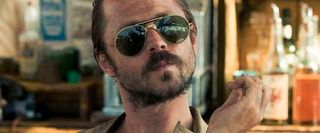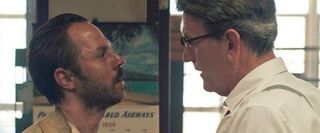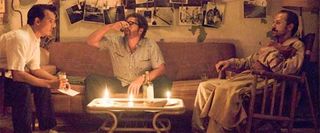Giovanni Ribisi Talks The Madness Of The Rum Diary

Moberg, portrayed by Giovanni Ribisi in the Bruce Robinson-directed adaptation of Hunter S. Thompson’s The Rum Diary, is an insane character. Stuck in Puerto Rico, his brain has been completely destroyed by drug and alcohol abuse, to the point that he has become a social pariah. He creates 470 proof alcohol, listens to records of Adolf Hitler speeches, and as basically lost his mind. But how do you play that kind of character without too far? Or is there such as thing as too far?
I was recently granted the opportunity to sit down with the actor one-on-one to discuss his part in the new film. Check out the interview below in which Ribisi reflects on shooting the film, talks about his unwashed wardrobe and delves into the mind of Moberg.
Was this something that you pursued, or did the project come to you?
Well yeah, I had worked on a movie called Public Enemies with Johnny, and then I heard that he was doing this. So I actually wrote him a little note saying if he needed any help with craft service or anything like that [laughs] that would be wonderful, I'm around, I'm available. Next thing I know, I was sitting in front of Bruce Robinson and we spoke about the character for a couple of hours. And then we all found ourselves down in Puerto Rico.
Is it weird to be promoting a film this long after you actually worked on it?
Yeah, I mean it's interesting. It's actually kind of nice, because I was talking to Graham King about that, and he was saying it's all about the timing. And I think this is the right time, this is a good time for this movie. And even if it sits on the shelf for a year, literally. I think they did that for Avatar as well. And so there was that... I don't know, it's actually kind of pleasurable to do this junket because so many memories, and it's, I have to say, doing this movie and you remember Puerto Rico, and the 1960's, and journalism, and Johnny's involvement and the rest of the cast, Bruce Robinson... it's so nostalgic, y'know? My memories are so romantic.
And because it's 60's set, does it feel like you're almost going back further?
CINEMABLEND NEWSLETTER
Your Daily Blend of Entertainment News
Yeah, exactly. There's something- we were shooting in old San Juan, which kind of transports your mind back to another era anyways. Um, but, you know, with the old cars and the outfits and the wardrobe. And in my character, who very well could have been in tent city in 1992 as well [laughs] And the smell of rum. It's really... again, romantic...
Now just to talk about your approach to Moburg, for starters the voice- how did you exactly avoid doing permanent damage to your vocal chords?
Oh god. Well that was something that Bruce, in that first conversation I had with him, we somehow got to talking about that at one point in the conversation and we got, boom, ok so we're talking about the voice and it was like: [Proceeds to make a nasally, bizarre sound. Laughter ensues]. That was Bruce's interpretation of it: [Makes the sound again. More laughter].And then I thought, ok, great. So then a month and a half or something like that goes by, a couple weeks. And I'm working on this voice, and I'm thinking, oh god, maybe he- well hopefully he forgot about that [laughs]. And then the first time, in the first rehearsal, he goes, “The voice, where's the voice? Let's hear it.” And so then I did it, and I guess he liked it. I was sort of hoping I could do something- I don't know, if it were up to me... I don't know.
And also, just the wardrobe- is it true that there was only one costume that you wore the entire time?
Yeah, yeah exactly. We didn't wash it at all.
Was that your choice? Their choice?
Yeah, I mean you can't do that, you can't wash Moburg's clothes for Christ's sake. This is a guy who has other priorities. He lives underneath the cracks and the crevices but his mind is so... I don't know, if you're going to do this, you really have to dive in. You have to get some dirt under the fingernails.

What exactly is your preparation process? And overall, but particularly for this part.
A good solid game of Russian Roulette. [Laughs. Ribsi then makes a series of bizarre noises, including the nasally one previously described.] And then, y'know, action [laughs].
I mean, do you construct a backstory at all? For example, how did Moburg exactly get to Puerto Rico? In your mind?
I think he probably washed up on a raft at some point, from the Korean War or something like that [laughs]. And I think that- well we had talked about the fact that he had probably been in the war, seen some things, and become completely disenchanted, and wanted to emigrate... but probably found it easier to go to Puerto Rico. And then he saw the same diseased, infested, capitalist mentality, corporatocracy, invading Puerto Rico, and he wanted to hide behind another reality.
So do you think he was at any point normal? Or that he's just kind of became not normal?
I don't know. I think so, I think so. War changes people. But maybe that's too easy. Maybe it wasn't war. Maybe he was intelligent enough to get that this is fucked, this structure is fucked. Fuck you with violence, fuck you with violence.
Where do you think the Nazi aspect of the character came from?
Um... “Fuck you.” [laughs] It came from that. It came from... it's not what, it's the fact that. It's the process. It's not the... what's it called... it's not what it's made of, it's the fact that you're doing it. And he's had a big, well- self revelation through that process. Not what that process consists of, but it's just the act, the act of saying, “Fuck you.” Do you know what I mean?

Totally. And the last time I talked to you was for Middle Men and Wayne from that film and Moberg are both kind of off the wall.
Yeah.
Is there a specific degree you have to match to go off-the-wall without going too far?
Um, no. This for me was, even just in doing a take, we'll take that and consolidate it out of its context- there is a take in acting. You have a scene, you've rehearsed it and now you're doing it with a camera angle and you're doing a take. There's so many different factors that go into forming each specific performance. There's the interaction with the other actors, there's the lighting, there's the time of day, there's everything. And, at this moment I wanted to jump whole-heartedly into that. Into that violence, into that mac truck, mashing into the brick wall. And that was, like, every moment. So for this, no. I think that the process of this film, the way I usually work as an actor, had to be completely from the ground up, be reconsidered. And it had to be dangerous. If it wasn't, then it's a failure to me.
I know I have to wrap up, but one thing I am curious about is... well, there's been Avatar 2 talk starting up again. Do you know if you're coming back for the sequel?
I'm not allowed say anything.
You're not allowed to say anything at all?
Yeah. I can't say anything [laughs]. Sorry.
Totally cool.
But we'll see.

Eric Eisenberg is the Assistant Managing Editor at CinemaBlend. After graduating Boston University and earning a bachelor’s degree in journalism, he took a part-time job as a staff writer for CinemaBlend, and after six months was offered the opportunity to move to Los Angeles and take on a newly created West Coast Editor position. Over a decade later, he's continuing to advance his interests and expertise. In addition to conducting filmmaker interviews and contributing to the news and feature content of the site, Eric also oversees the Movie Reviews section, writes the the weekend box office report (published Sundays), and is the site's resident Stephen King expert. He has two King-related columns.
Most Popular



